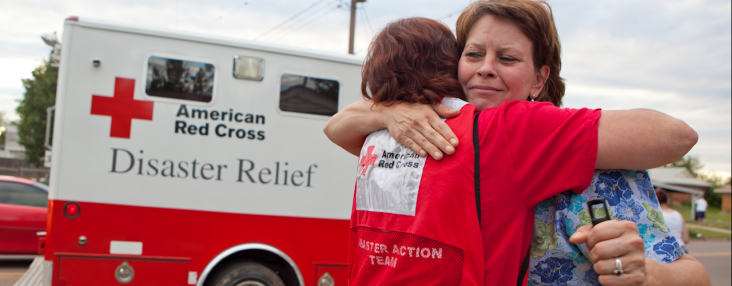Red Cross leader says monetary, blood donations most needed for NEA
by December 26, 2021 10:25 am 926 views

An army of volunteers from the American Red Cross has been on the ground in Northeast Arkansas in the aftermath of the Dec. 10th deadly tornadoes that devastated the region. The group’s Arkansas leader, Lori Arnold, executive director for the American Red Cross Serving Greater Arkansas, says the needs are varied for those impacted.
“We’ve got people who’ve had some damage to their houses and then people whose homes are completely destroyed. So not only were we helping with sheltering, feeding, all those immediate emergency supplies and needs, but we’ve been helping them with the things that maybe aren’t so obvious to someone who this hasn’t happened to,” Arnold said. “For instance, we have health care workers who are out there who are helping replace medication that’s been lost, medical equipment that’s been lost. We have volunteers who are licensed emotional support caregivers, and we’ve got spiritual care out on the ground too.”
After an initial assessment phase of the damage, Arnold’s team has been coordinating with nonprofits and governmental officials to deploy much-needed help. The volunteers assembled by the Red Cross come from “every walk of faith, every age group” and are trained in a multitude of disaster relief protocols.
“We’ve kind of moved out of the initial response phase, and now we’re helping people with their next steps. Where are they going to live? How are they going to replace some of their important documents? That kind of thing,” she said.
Arnold said the Red Cross will stay in the region “as long as we’re needed” but eventually life returns to some sense of normalcy for victims of a disaster and other tragedies take her nonprofit to the next challenge. Right now, there are three main ways that people can assist the Red Cross, she said.
“There’s three main ways that people can help. Financial donations are the easiest and best way to help people get what they need. We’re able to identify the needs on the ground and purchase the things that are needed while we’re there. We’re able to give financial assistance to people who’ve lost their homes completely, and that way they can assess what they need and they can use that money to purchase their individual household needs.
“But we also need people who are willing to volunteer. In a situation like this, you know, we may not need someone to volunteer specifically for the current disaster, but we want people who are volunteers and trained so that the next time this happens, they’re ready to get up out of their beds and go help,” Arnold said. “And then the third way to help if you don’t have the time or perhaps the financial resources, we’re always looking for people who can give blood. Giving blood right now is extremely important, as it is all year round. But right now with this historically low blood shortage across the country, giving blood is another great way that you can help serve your fellow man and help save a life.”
You can watch Arnold’s full interview in the video below.
